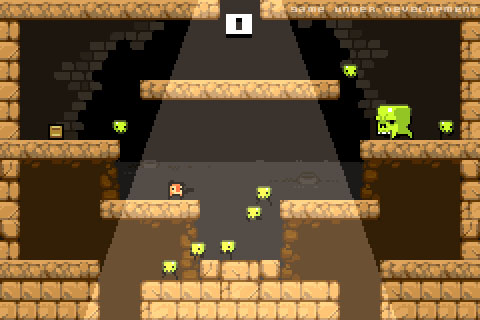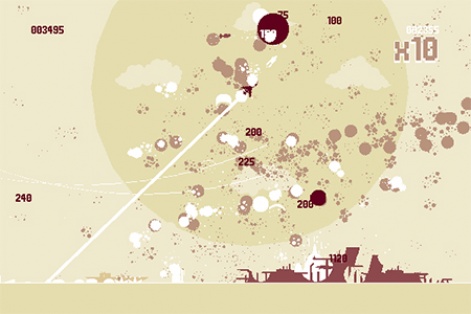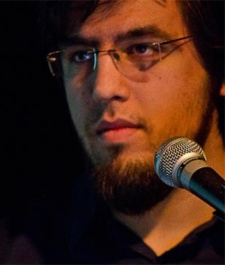When news of a Radical Fishing clone spread across the web Ninja Fishing the alleged culprit the Dutch studio's reaction was covered extensively across the media.
Business and development head Rami Ismail took to the press to detail his genuine fear that his studio may have been over before it had really begun.
Luckily, this story had a happy ending. Ridiculous Fishing, the iOS follow up to the original title, has enjoyed success aplenty since and, along with the studio's now extensive library, has helped ensure that its longterm future is no longer an imminent concern.
In the second part of our interview with Ismail, we probed deeper to find out whether Vlambeer's strategy of open development detailed in part one is to blame, and what steps the studio has taken to ensure it isn't quite as exposed to the clones.
Pocket Gamer: In your interview with Polygon in April, you claimed that the only alternative to your open approach is that you hold back your prototypes and, as a result, never release the final game. Is the choice really that black and white?
Rami Ismail: It's not that black and white, but there is an important distinction between having that and having it exist on your hard drive, with people you know and trust who are in your own bubble.
It essentially still means that [the games] don't really exist, right? Douglas Wilson [of Danish studio Die Gute Fabrik] is going to hate me for saying this, but a video game is nothing if it's not being played.
It's a dialogue between designer and player, and the game is the medium through which that conversation happens.
If you have a game, but you don't have a player, there's nothing. It's just a few lines of code on your desktop compiled into an icon that you can double click. It's not worth anything beyond that it's a thing on your desktop.
And if you only play within your own bubble, you end up getting the same perspective on it, and getting a different perspective is so important.
The worry we have by closing development to that bubble is that we would miss out on a lot of interesting realisations, feedback and perspective.
Sure, you can do a closed release or something, you could release it to a certain group of people, or certain group of fans, but then who are you kidding? It's still going to get out everywhere.
When you first got started you had your forums and brought your fans in, but you felt that was too closed, so you started paying attention to NeoGAF and social media. Now your popularity has grown, do you think you could get the level of feedback you're after from a dedicated fanbase instead of pushing games out on Flash portals?
I don't think so. I think in the end you're still risking the same thing - creating a bubble of people that already like us, talking about games we make.
That's great, but it cuts out the feedback from people who have never heard of us, that don't know what we're about, that don't know what we're doing.
A lot of the people who like Luftrauser have no idea that we made Super Crate Box until they start talking to us. That's a conversation I have a lot, where people go like "Oh, man, I love Ridiculous Fishing," they talk a bit, and figure out that we also worked on Luftrauser, and then they connect [us with] Super Crate Box.

Super Crate Box
Having the perspective of people who don't know about us, or don't necessarily like us, we think that's sort of important. We really don't see the benefit of closing that down.
Might it represent less risk, though? You can't completely eliminate the risk, of course, but at the moment it seems like there's a certainty that a Vlambeer game is going to be cloned...
[Laughs] As soon as we decided that we were going to do Luftrausers we created the logo, we posted that on our blog, then we made a big announcement. Instead of closing down and making it a secret, which is what we did with Ridiculous Fishing, we decided to just open it up completely.
We said, "Guys, we're working on the sequel to this, here's a link to the original game, here's the logo, here's what our plans are, go for it. Go crazy. We're gonna have this done by winter of 2012," and then we were like seven months late. But we decided to do the opposite and own our ideas.
When SkyFar hit, people are so aware that this is a clone that they revolt, right? They [say] "This is not okay."
I guess that is a shift that has happened in the industry anyway, from clones being just part of the industry to clones being a damaging part of the industry.
I think Zack Gage said this: If you clone something you get an inferior product. It is always going to be an inferior product, and I think that sort of safeguards us from something like that.
I can't say that it safeguards us completely, because obviously everything that we make gets stolen, but we learn to be more open about that, and I think being more open about that saved Luftrausers from being cloned.
But it was cloned.
Yeah, it was cloned, but the clone did absolutely nothing. People realised how to react.
The people that wrote about it didn't put the link to the game in their articles, so you'd have to search for it yourself. Articles actually flat out stated that it would be a bad idea to buy this game, because it's a clone, and Luftrausers is almost done.

Luftrausers
It might sound a bit subjective, but my biggest complaint during the Ridiculous Fishing story was that a lot of people felt the need to be objective. They felt the need to say "Okay, it's a clone, but it's a good game, so it gets an 8 out of 10."
That objectivity - that hurt.
Do you think the difference between the way the press reacted to Ninja Fishing, and the way it reacted to SkyFar is a reflection of indies becoming a hip topic, making the press more sympathetic, or is the press simply reflecting a genuine change in the way their audiences feel about cloning?
I think it's a combination of both. Obviously, for the press, for people who write about games, stories about people are more important than just stories about games.
In your comments to the press about SkyFar you expressed your exhaustion at the idea of having to deal with yet another cloning issue. Do you foresee a day when that exhaustion finally drives Vlambeer to change its open development process?
No. I would rather do the same thing over and be exhausted than let [open development] go.
Vlambeer is about doing the right thing. It's something we get a lot of shit for from a lot of people - like the in-app purchase thing where we just said "Well, we think in-app purchases, the way they're implemented now, they're just immoral in a lot of ways. We're not going to do that."
You've said that Vlambeer games come from a position of positivity. Do you think it's just going to get easier over time for you to deal with cloning without losing your positive attitude?
The way me and Jan [Willem Nijman, Vlambeer's game designer] deal with that is we just find bigger challenges.
Jan started organising the 7 Day FPS Challenge. I organise a game jam called Fuck This Jam - which is the kind of jam that gives writers headaches because they need to figure out how to write it in a headline.
I co-organise the Indie Megabooth. I do a lot of things with education in the Netherlands, and workshops and seminars around the world.
We try to find new challenges, new and interesting things to work on, and having progress on those keeps us feeling like we're moving somewhere.
I think a lot of what makes us happy is the sense of momentum. The sense of doing something useful and making games. If we can make games and do cool stuff Jan also organises local multiplayer picnics if we can be useful and make games, then that is the optimal situation for us.
Thanks to Rami for his time. You can read part 1 of our interview here.
Dennis Scimeca is a freelance writer from Boston, MA. You can follow him on Twitter @DennisScimeca.






















